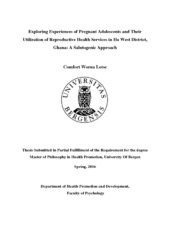| dc.description.abstract | Adolescent pregnancy (AP) is a significant public health problem across Africa. In the Volta Region of Ghana, 32% of adolescents were exposed to unintended pregnancies in 2011 due to lack of knowledge and use of available methods of contraceptives. In addition to the health consequences, adolescent pregnancy also contributes to the perpetuation of poverty cycle among populations. Although several studies have investigated problems associated with adolescent pregnancy, its risk factors and prevention, few have examined the experiences that pregnant adolescents and adolescent mothers go through in their communities. From a salutogenic theoretical perspective, this study explored adolescent lived experiences with a focus on stressors and resources inherent. Issues surrounding their utilization of reproductive health services were also explored. Objectives: The objectives of the study were to identify, through exploration, stress and resource experiences of pregnant adolescents and adolescent mothers. Methods: Qualitative methodology with phenomenological design was used and the salutogenic model formed the theoretical framework. Data collection techniques included in-depth interviews and focus group discussions. Interviews were conducted with 6 key informants (two Queen Mothers, two Health personnel, two teachers, and an NGO official) and 11 adolescent girls (6 pregnant and 5 mothers). Data were transcribed, coded and analysed using Attride- Stirling's thematic network analysis. Findings: Five stressors emerged: a) severe economic/financial constraints before/after pregnancy, b) educational/schooling difficulties, c) Psychological, social and emotional stresses d) Cultural and Religious constraint e) Misinformation about and stigmatization of ARHS. Resources that emerged included a) support from parents, educated family, benevolent persons, female teachers, and churches b) Personal strength and courage (Hardiness) c) Availability of reproductive health services (RHS) d) The community midwife e) Traditional Birth Attendants (TBAs) f) Existence of government policies (NHIS, GES directives, NGOs). Conclusions: Pregnant adolescents and adolescent mothers experience multiple stressful life events with few resources to deal with such stressors. These stressors limit their access to and utilization of adolescent reproductive health services. Stakeholder action to provide more support to adolescents and education for their families and communities are recommended. However, the pregnant adolescents and adolescent mothers in the Ho west district in the Volta Region of Ghana are able to thrive amidst all these stressors due to the strong sense of coherence hardiness on the part of the girls and the availability of a community midwife. | en_US |
